Projects
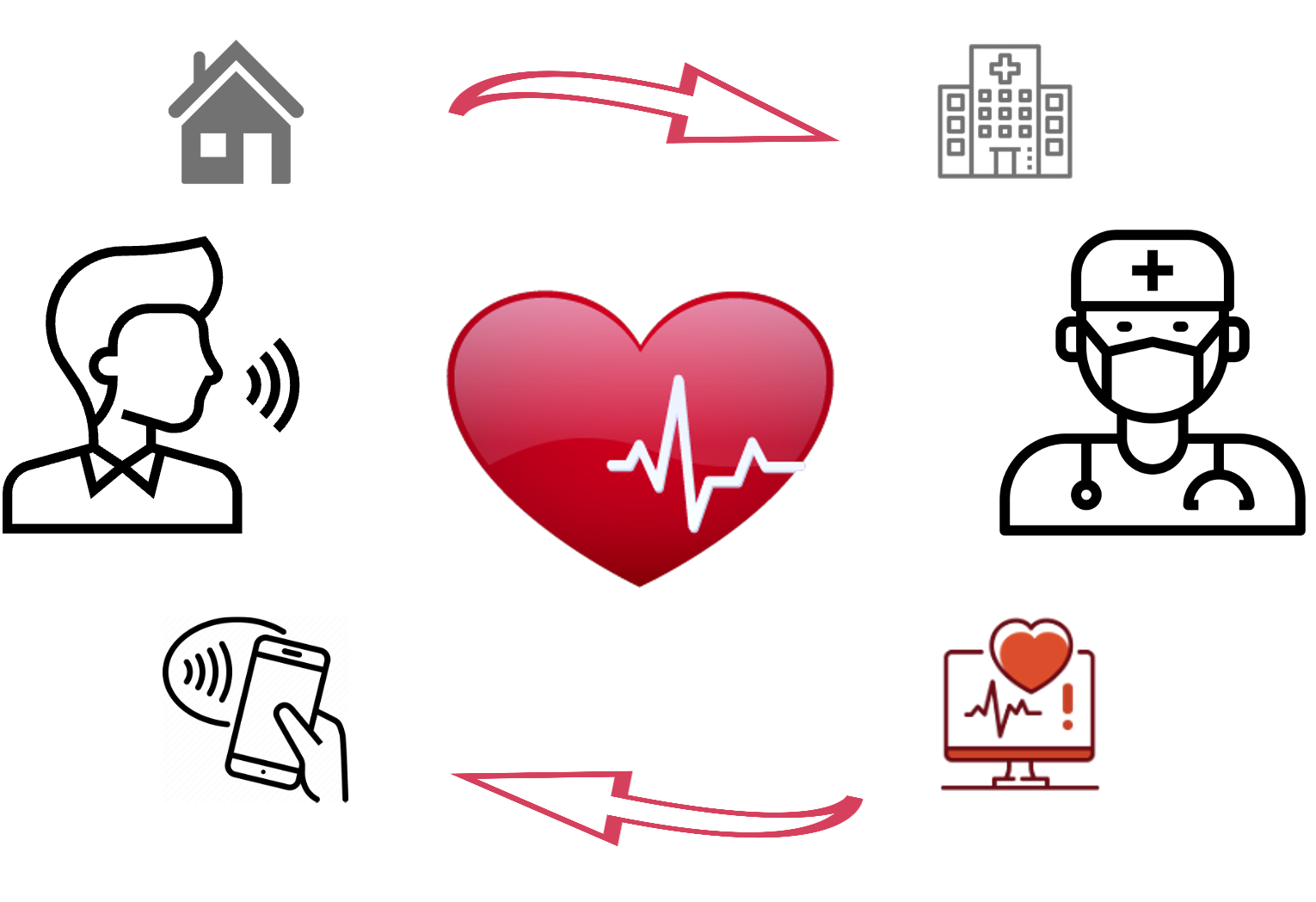
Project contact:
Fan Wu
Filipe Barata
Voice Monitoring System for Patients with Congestive Heart Failure
Congestive Heart failure (CHF) is characterised by the heart’s incapacity to pump sufficient blood to meet the body’s metabolic needs. It afflicts over 64 million people worldwide and is increasing in prevalence. The high hospital readmission rates do not only pose a tremendous burden on patient’s health status, morbidity, and mortality but also significantly increase national healthcare costs. In fact, two-thirds of HF hospitalisations can be prevented according to the leading experts. In order to reduce hospitalisations, traditional self-management require patients to log their weight and blood pressure daily in written plans of action that cover how to recognise and respond to a decompensation. However, the self-management require high adherence and active engagement from the patients and they are lack of predictive power.
Due to the decreased cardiac output or increased blood pressure, fluid can accumulate in the entire body of CHF patients. Thus, we hypothesise that the vocal folds might be particularly sensitive to fluid accumulation in contrast to weight changes that may not be detected in time to prevent hospitalisation due to decompensation. For the current project, we aim to collect voice samples with mobile devices and using machine learning methods to investigate how voice characteristics fluctuations are associated with the health status changes of HF patients. Integrating passive voice analysis into patient self-care has the potential to reduce the burden on the patient while providing objective information with clinical valuable accuracy. We contribute towards the development of a novel digital prognostic vocal biomarker for CHF patients.
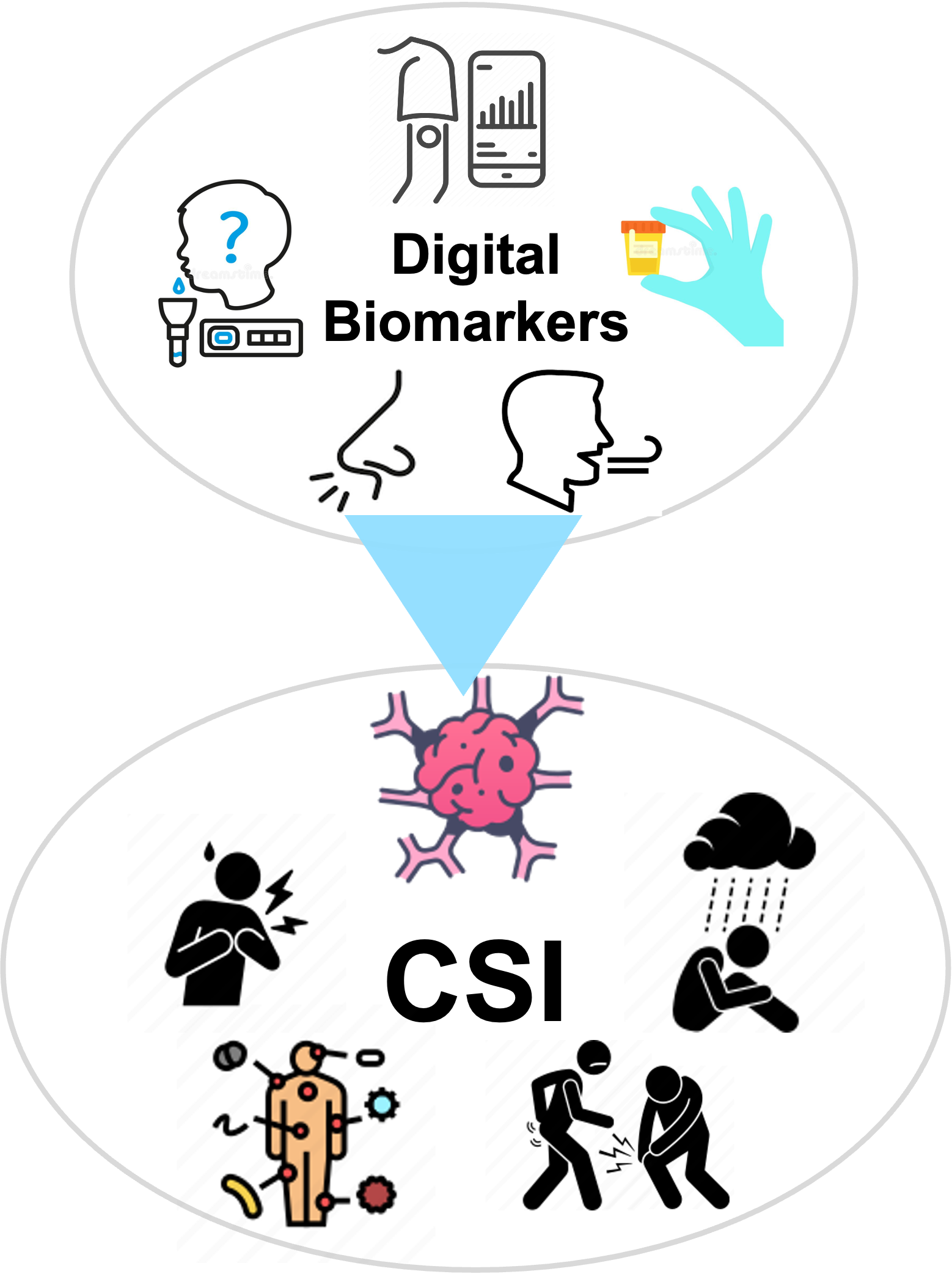
Project contact:
Jinjoo Shim
Filipe Barata
Digitalization of Inflammatory Biomarkers for Chronic Systemic Inflammation (CSI)
Several studies have shown robust evidence between the chronic systemic inflammation (CSI) and increasing risk of various non-communicable diseases (NCDs) and mortality. As opposed to an acute inflammatory response that is characterized as a temporary upregulation of inflammatory activity in response to a threat (e.g., bacterial infection), the CSI is a low-grade, non-infective state triggered by certain social, psychological, environmental and biological factors. The prolonged CSI leads to major alterations in organs and fatal impairment of immune system of an individual, which triggers the onset and development of hypertension, hyperglycemia, type II diabetes, autoimmune diseases, cardiovascular disease, chronic kidney disease, several types of malignancies, depression and sarcopenia. Since the NCDs significantly affect individuals (e.g., reduced life expectancy, poor quality of life), household (e.g., increased health expenditure), and macroeconomy (e.g., losses in economic growth), early diagnosis and timely treatment to intervene the CSI and risk factors associated with NCDs become critical.
The C-reactive protein and cytokines (e.g., interleukin (IL)-1β, IL-6, IL-8, IL-10, and tumor necrosis factor-α) provide valuable insights on inflammatory activity. Recent research has investigated the detection and quantification of these markers in body fluids other than serum such as urine, sweat, saliva, and exhaled breath of patients with various NCDs. A non-invasive (digital) biomarker would help alleviate multiple burdens from invasive blood tests and contribute to the self-management of patients. Furthermore, it would add significant values to clinicians and caregivers by enabling meaningful treatment and effective prevention of future events.
Hence, this project aims to investigate 1) to what extent biomarkers indicating the presence of health-damaging chronic inflammation can be measured non-invasively; 2) to what extent these biomarkers can be digitalized applying AI/ML algorithms.
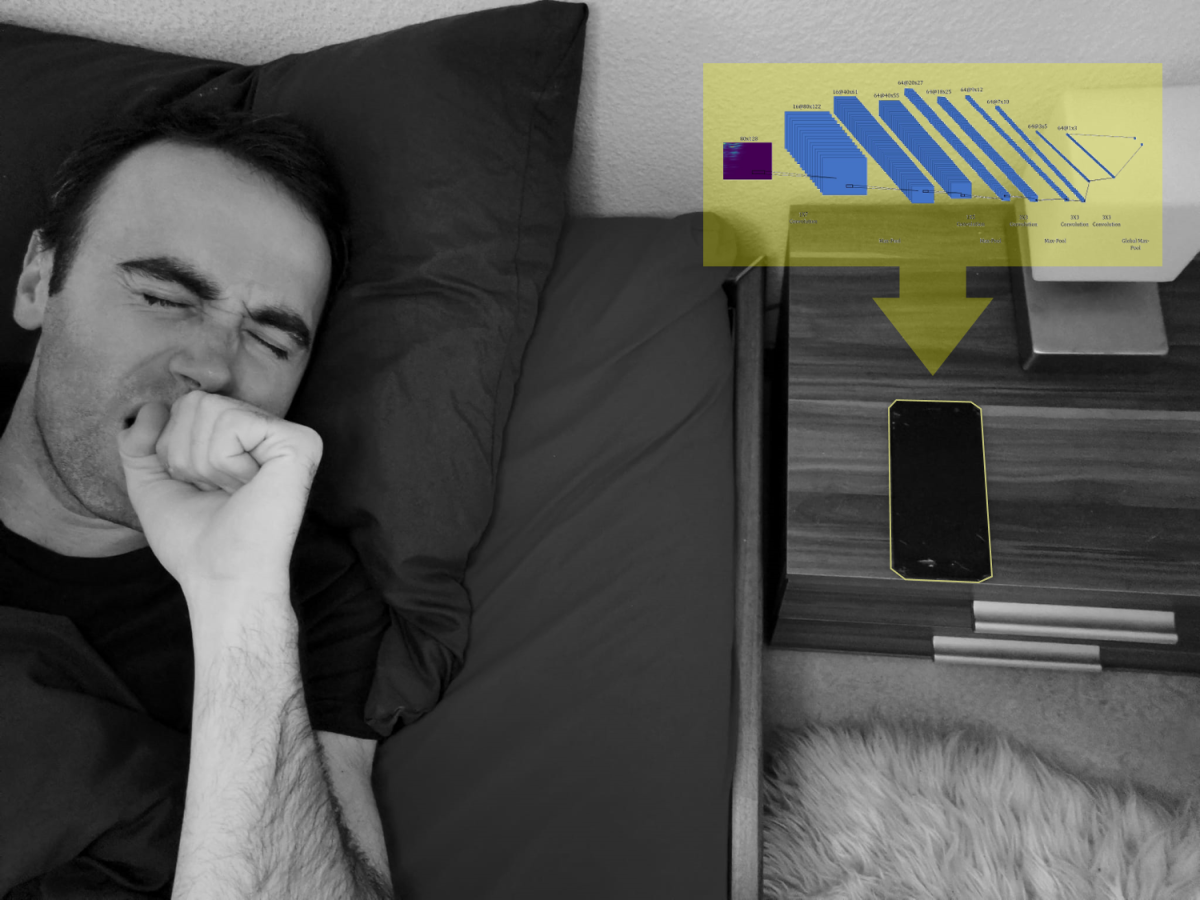
Project contact:
Filipe Barata
Smartphone-Based Cough Detection
Smartphone-based cough detection has the potential to enable cost-efficient and scalable home
monitoring for the most prevalent respiratory diseases such as asthma, COPD, and COVID-19. In previous
research, we have established the feasibility of cough recognition from longitudinal smartphone-based
audio recordings, i.e., an automated cough detection algorithm achieved results comparable to those
of a human annotator by detecting coughs in audio files recorded by a smartphone. These results were
published in leading digital health journals and conferences such as the Journal of Medical Internet
Research, the IEEE International Conference on Healthcare Informatics, and the IEEE Journal of Biomedical and Health Informatics. Also, the developed technology lead to the foundation of the startup Resmonics AG, a spin-off company of the Centre for Digital Health Interventions. Currently, we leverage this technology to investigate cough counts as a predictor for
disease progression.
Smartphone-Based Cough Detection in COVID-19
In this project, we leverage the cough detection technology to investigate the potential of a real-time cough monitoring system for the monitoring of COVID-19 patients and to associate hourly and daily cough counts with disease progression and intensive care unit admissions. To this end, 46 patients were recruited and were monitored during their hospital stay. Finally, the study received ethical approval (BASEC ID: 2020-00741) and was completed successfully. The first manuscript has been submitted.Smartphone-Based Cough Detection in COPD
In this project, we employ smartphone-based cough monitoring to investigate the relation between daily and nightly cough counts with the course of disease in patients with chronic obstructive pulmonary disease (COPD) during and after an exacerbation. The study received ethical approval (BASEC ID: 2020-02207) and is currently ongoing.Journal of Medical Internet Research, July 2020.
Barata, F., Tinschert, P., Rassouli, F., Steurer-Stey, C., Fleisch, E., Puhan, M.A., Brutsche, M., Kotz, D., and Kowatsch, T.
doi
In IEEE International Conference on Healthcare Informatics (ICHI), June 2019.
Barata, F., Kipfer, K., Weber, M., Tinschert, P., Fleisch, E., and Kowatsch, T.
doi
IEEE Journal of Biomedical and Health Informatics, February 2022.
Jokic, S.+, Cleres, D., Rassouli, F., Steurer-Stey, C., Puhan, M.A., Brutsche, M., Fleisch, E., Barata, F.+
(+First and last author contributed equally.)
doi
Student Projects
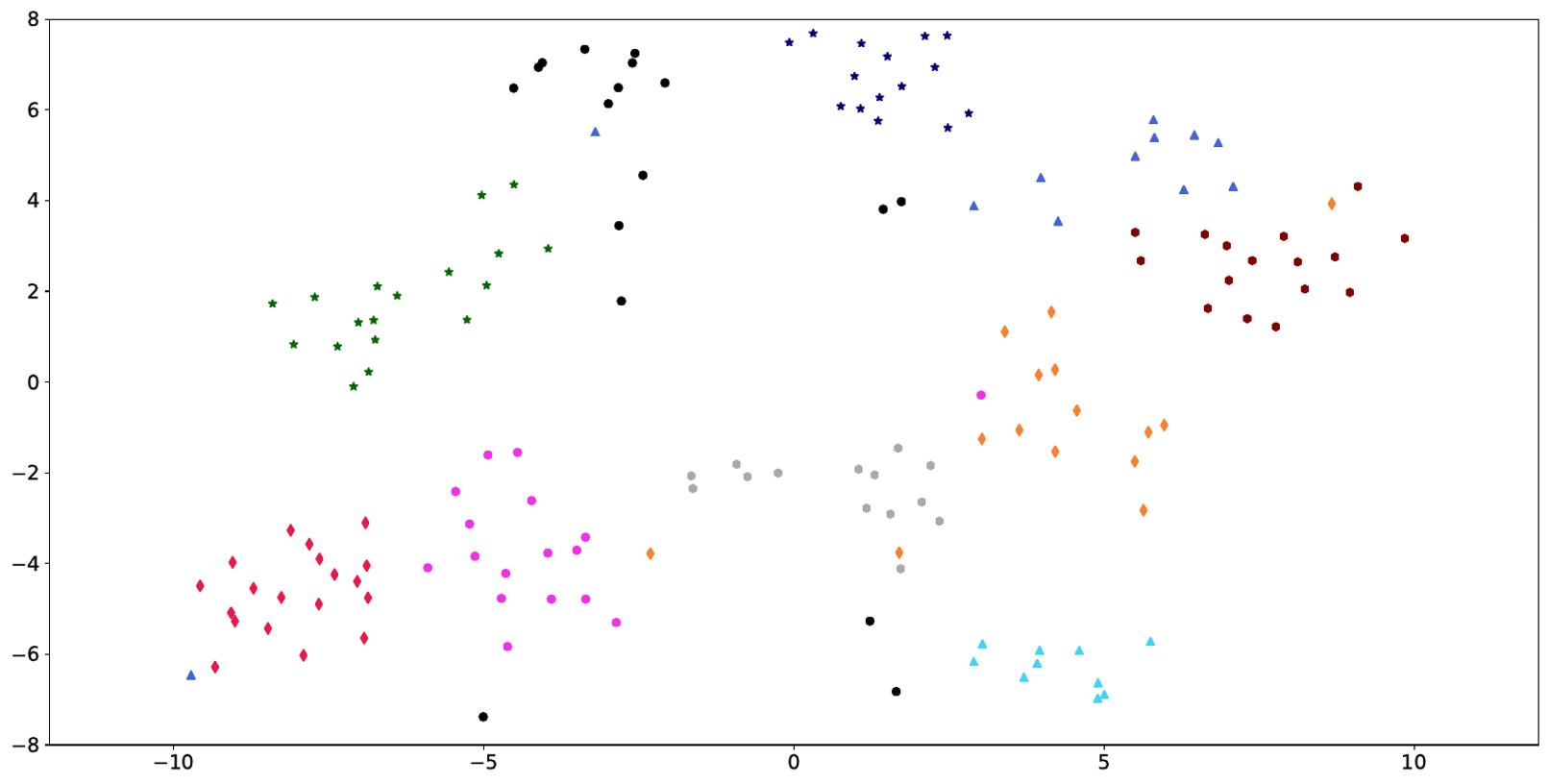
Project contact:
Stefan Jokic
David Cleres
Filipe Barata
Cough Assignment
In this work, the focus is on developing a machine learning model for speaker verification and identification from smartphone audio recordings of respiratory symptoms, such as cough. Speaker verification would enable an unambiguous contact-free assignment of symptoms to one patient. This is especially interesting when more than one person is coughing and a cough must be assigned to the corresponding patient who is coughing. The final goal is to compare the performance of the algorithm to the one of human annotators.

Project contact:
Michael Bachmann
David Cleres
Filipe Barata
New Architectures for Cough Detection
Coughing is the most common complaint as to why individuals seek medical advice. In consequence, many efforts have been made towards creating an objective measure for cough. To date, however, there is no standardized method, and there is no sufficiently validated generic automatic cough monitor that is commercially available and clinically acceptable. In this project, we aim to push the frontier in cough detection research by improving the performance in Machine Learning-based cough classification.
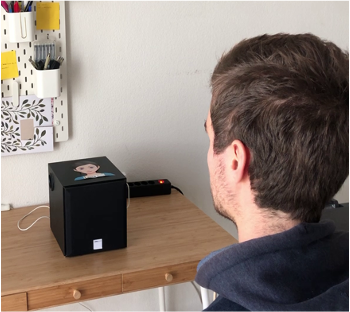
Project contact:
David Cleres
Filipe Barata
Smart Speaker for Remote Patient Monitoring
Smart speaker technology has the potential to enable remote patient monitoring by facilitating the collection and sharing of health-related information [1]. This is especially relevant for the elderly target population. In this project, a smart speaker system based on Raspberry Pi was built to acquire clinically validated surveys and its acceptance among COPD patients was evaluated [2]. A short demonstration in German can be found here.
Journal of Medical Internet Research, March 2021.
Bérubé, C., Schachner, T., Keller, R., Fleisch, E., v Wangenheim, F., Barata, F.+, and Kowatsch, T.+
(+co-last authors)
doi
In Joint Proceedings of the ACM IUI 2021 Workshops, co-located with 26th ACM Conference on Intelligent User Interfaces (ACM IUI 2021), July 2021.
Cleres, D.**, Rassouli, F., Brutsche, M., Kowatsch, T., and Barata, F.
pdf
url